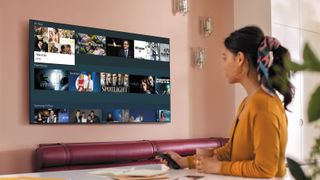Don’t want an 8K TV? Soon you might not have a choice
Opinion: Samsung looks to dethrone 4K

8K TVs are some of the most divisive new products to enter the AV market in some time. With undeniable increases in the sharpness and detail of an image, and incredible upscaling processes making even HD sources look at home, it’s not hard to see the potential of the technology – even if much of that potential still feels somewhat far off.
With little to no 8K content out there to watch – aside from the odd YouTube video, we guess – the sell is really in the upscaling for now, and that’s something that doesn’t feel overly necessary given 4K TVs don’t have to work nearly as hard to upscale low-res content, or to display in native 4K.
However, for anyone looking to buy one of the best TVs, with the most high-end design and specifications, an 8K TV may become harder and harder to avoid.
A package deal
Samsung in particular is pushing 8K technologies pretty hard, with three 8K models from the TV brand in 2020 compared to only one in 2019.
We’ve already seen the effects of this on Samsung’s 4K range, with the 4K flagship Q90T actually being lower specified than last year’s equivalent, the Q90R. As TV makers like Samsung hoard their best technologies for their 8K products, 4K is going to be left without them – meaning that 4K doesn’t just get outrun, but also diminishes in comparison to previous 4K TV iterations.
This slight drop in specification has actually happened across the entire 4K QLED range, too, though some shuffling of product names. This year’s Q80T is actually a successor of the Q70R, the Q70T of the Q60R, and so on. The new Q60T – the cheapest QLED TV this year – isn’t a successor of anything, being a new model inserted into the bottom of the range, with a mid-spec Quantum Processor Lite processor instead of the Quantum Processor 4K used by the sets above it.

A Samsung rep tells us that this is intentional – that the idea is to make ‘8K’ mean more than just a resolution, and encompass a wide range of premium technologies that elevate it above its 4K counterparts. That's why we only see a zero-bezel (well, 1mm bezel) all-screen design on the Q950TS and Q900TS, rather than on the 4K flagships. That's also why the high-end OTS+ audio system is saved for the top 8K models only.
Get daily insight, inspiration and deals in your inbox
Get the hottest deals available in your inbox plus news, reviews, opinion, analysis and more from the TechRadar team.
A 4K in the road
While this means that top-end TVs will keep improving, it also means that those wedded to 4K – especially those without the space for the larger screen sizes that 8K necessitates – may be worse off buying a Samsung TV in 2021 or later than if they hunkered down with one now.
We’ll no doubt see the first of the 2021 range announced by Samsung and others in the new year, and that may be the biggest warning sign of the fate of 4K at the world’s biggest TV brand.
In the meantime, though, there are plenty of great 4K TVs on the market – and the upcoming Amazon Prime Day and Black Friday sales are likely to see a number of them get hefty discounts.
OLED TVs are likely to stick with the 4K resolution for some time longer, too, given the price increases of implementing both 8K resolution and an OLED panel (something found in the LG ZX, but is nowhere near as common as 8K LCD screens). For those resisting the arrival of 8K, though, it’s only going to be so long before 8K is synonymous with a new TV, the way 4K is now.
- Black Friday TV deals: what's going to be on sale?
Henry is a freelance technology journalist, and former News & Features Editor for TechRadar, where he specialized in home entertainment gadgets such as TVs, projectors, soundbars, and smart speakers. Other bylines include Edge, T3, iMore, GamesRadar, NBC News, Healthline, and The Times.

